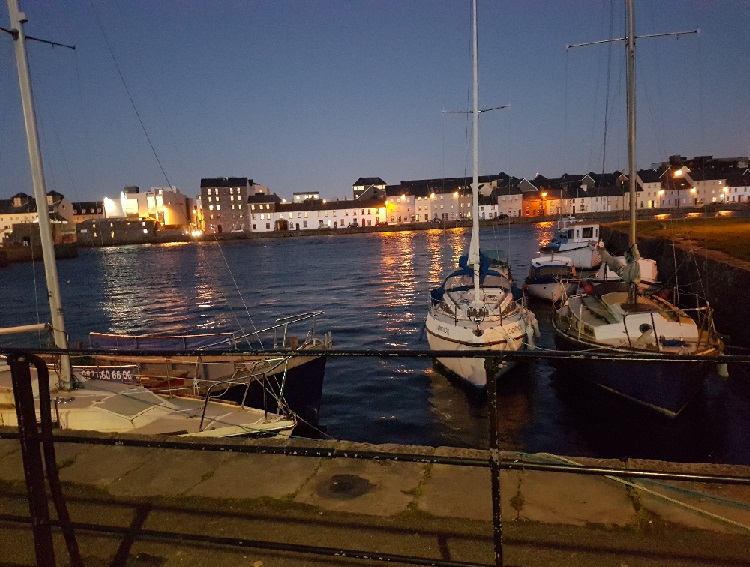Out Here | 2 | Fistfuls Of Heritage
This story begins in the Congo, Wally Nkikita and Philippe Toko’s homeland. It winds its way from there to Galway, Ireland. Tracing a long path from one life to the next. All the way to this evening in Áras Na nGael on Dominick Street. Where faded photos of De Valera and Ireland’s constitution hang alongside banners emblazoned with “Galway African Diaspora”, the name of Nkikita and Toko’s organisation.
The pair have dedicated themselves to showcasing “Afro-Caribbean culture and diversity in the City of Tribes.” A broad bracket that includes people from Nigeria, Angola, Ghana, and the Congo. And tonight, one of the Diaspora’s Afro-Music nights, is a chance for the city to celebrate these cultures and people who have come a long way to find a home. And who each brought a fistful of heritage to throw into Galway’s melting pot.
A few hours earlier, around the corner in a packed coffee shop, accents and laughter filled the room and the smell of cigarette smoke drifted in from out back. Nkikita and Toko told me about being Africans in Ireland, about bringing their fistfuls of the Congo to Galway – the music and art and language they are proud to call their own – that they have set about weaving into Galway City’s tapestry. That’s what brought Toko to Galway.
He came west in 2001, after three years in Ireland. And set up a shop selling the crafts of Africa. While Nkikita arrived in 2010. He founded the Diaspora in the last two or three years. Not just as a way for Galway’s African community to keep in touch with their homelands, but as a way to enrich the city. To add extra voices to its choir.
“Galway,” Nkikita said, “is a loving place.” The city has welcomed the many peoples who have moved here. And through that movement it has forged its own culture. Where the different ways blend and mix on the cobbled streets. One busker’s country and western song might fade into an Irish air. Before the sound of an African drumming class takes the airwaves around the next corner. These sounds do not fight each other. Instead, they come together like a collage of peoples. Just as the different accents did in that coffee shop. Where Toko was explaining just how varied Africa is.

He said that there are 54 countries in Africa, that within each of them there are different tribes. And that many of them are trying to divide the land further. To jigsaw the continent apart. But there are no factions in Galway’s Diaspora. As Nkikita said, “It’s like a family: you can have 5, 6, kids who will be different. But they have the link – something that links us to Africa.”
That something cannot be pinned down or generalised. To be from somewhere is a complex matter. It is not as simple as learning the language or national anthem. Nor is it as easy as conforming to a stereotype. Nationality is about belonging. In both the individual – feeling at home in your self and country – and communal sense. Where the people nurture the person’s sense of self. Toko told me there is no single thread that unites all the people in Galway’s African Diaspora. Rather, what brings them together is an individual pride in their selves and their heritage. And somewhere between the two lies nationality.
There is a distinction between nationality and patriotism. One is belonging, and the other is devotion to an idea. The Diaspora’s mission is to foster that belonging. No one has to conform to a fixed notion of what it means to be African. Instead, they are free to experience that culture on their own terms. Whether they fit its demographic or not.
Nkikita has found that Galway’s people took an interest in the Diaspora’s goals. Through teaching them African drumming and dancing, and hosting African art exhibitions in the city, he has forged a bond between his own culture and his new home. Once the two ways would not, and could not, have come together. But as the world turns into the 21st century, its borders are being erased. More people leave their homelands every day. And their footsteps scuff the imaginary lines that cross our planet, wearing them away. Until even the boundaries between individuals will vanish. Just as each of those buskers’ songs merge in the air.
Hours ago, Nkikita and Toko left that coffee shop. Now, in Aras na nGael, only the two of them and the sound engineers are here. Setting up the PA for the night ahead. Every few minutes a blast of Congolese soukous music fills the stone-walled venue. Rattling the bottles behind the bar. There’s an accordion tucked into a nook, and pamphlets written in Irish stacked on tables. The sound engineer shouts instructions over the music in a thick English accent. And even over the thump of the drums you can hear the smile in his voice.
